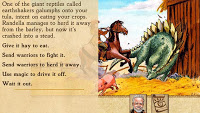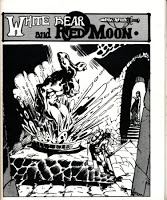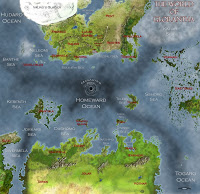The legendary game world of Glorantha has been transferred to Moon Design Publications. This world has spawned outstanding games for 40 years and is one of the best-known and best-loved places for games and gamers. The roleplaying games of RuneQuest, with over 50 outstanding supplements, and HeroQuest, as well as boardgames and a computer game, have entertained and challenged gamers for a generation. As of August 12th, 2013 Greg Stafford has transferred ownership, creative control and all related intellectual properties to Moon Design Publications.
(Much more at the link.)
 I confess I was never much of a Runequest fan myself, although I’m familiar with the basics. Ditto for Glorantha itself. One thing I do like about it was the way they integrated different types of games and non-game products into the setting.
I confess I was never much of a Runequest fan myself, although I’m familiar with the basics. Ditto for Glorantha itself. One thing I do like about it was the way they integrated different types of games and non-game products into the setting.
 I particularly like the fact that it wasn’t just a role-playing setting. There were straight-out hex-and-counter wargames like White Bear and Red Moon (later republished as Dragon Pass), as well as what would today be called a “domain management game” called King of Dragon Pass, made for computer in 1999 and later released as an iOS game. Plus there has been fiction (five books), a comic book series, and, of course, a myriad of role-playing adventures, setting books, and other supplements. And several lines of miniatures.
I particularly like the fact that it wasn’t just a role-playing setting. There were straight-out hex-and-counter wargames like White Bear and Red Moon (later republished as Dragon Pass), as well as what would today be called a “domain management game” called King of Dragon Pass, made for computer in 1999 and later released as an iOS game. Plus there has been fiction (five books), a comic book series, and, of course, a myriad of role-playing adventures, setting books, and other supplements. And several lines of miniatures.
That, to my mind, is a model for the way a fantasy setting should be handled. Not just as a fantasy roleplaying setting, but a fantasy setting that can be used for a variety of different purposes.










One of the advantages that Glorantha has over most settings designed for gaming is that it was not made for gaming. It was a way for Stafford to play with ideas of mythology, which he then turned into a wargame, then into a roleplaying setting. The only other setting that I can think of that had that advantage, and was also turned into a gaming setting by its creator, was Tekumel.
Also, Great Old Games has King of Dragon Pass for a very reasonable price.
I've often wondered why you never really saw anyone else try and copy the concepts behind Glorantha. Maybe because it was so tied to Runequest that it didn't have much impact in regular D&D fanbases.
Hedgehobbit: But you did, occasionally. Not always well, but people did try to incorporate ideas from RuneQuest into D&D. An example (I would argue of the clumsy sort) was the incorporation of clerical special abilities that varied by the god of the cleric, so that a follower of St. Cuthbert, for instance, gain a bonus spell they can use once/day at various levels, depending on the specific order of the cleric. I can't guarantee that it is so, but I think that these abilities are modeled on the special spells and skills available in particular cults in RQ.
That seems a bit of a stretch; faith specific abilities pertinent to a given patron is such an obvious idea that any random game developer working on D&D or any other system could reasonably arrive at it in a vacuum without having to resort to plagiarism of RQ.
Ed Hastings: OK. Two points, though. First, no one did, not in that way (see, for instance, the way that Empire of the Petal Throne chose to implement the basic concept) until RQ came along. Then the idea started to be implemented in that way in a variety of games. Others chose to continue exploring the way that EPT did, see Hârnmaster for instance, or Chivalry & Sorcery, or most of the implementations that GURPS has made of "religious magic".
Second, no one is accusing anyone of plagiarism. Deriving inspiration or adapting ideas from someone else is not plagiarizing them.